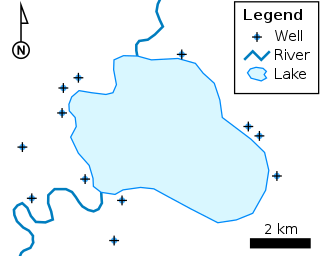
Oracle is an American multinational computer technology corporation headquartered in Austin, Texas. The company was formerly headquartered in Redwood Shores, California, until December 2020 when it moved its headquarters to Texas. The company sells database software and technology, cloud engineered systems, and enterprise software products—particularly its own brands of database management systems. In 2020, Oracle was the second-largest software company in the world by revenue and market capitalization. The company also develops and builds tools for database development and systems of middle-tier software, Enterprise Resource Planning (ERP) software, Human Capital Management (HCM) software, Customer Relationship Management (CRM) software, Enterprise Performance Management (EPM) software, and Supply Chain Management (SCM) software.
In computers, case sensitivity defines whether uppercase and lowercase letters are treated as distinct (case-sensitive) or equivalent (case-insensitive). For instance, when users interested in learning about dogs search an e-book, "dog" and "Dog" are of the same significance to them. Thus, they request a case-insensitive search. But when they search an online encyclopedia for information about the United Nations, for example, or something with no ambiguity regarding capitalization and ambiguity between two or more terms cut down by capitalization, they may prefer a case-sensitive search.

Esri is an international supplier of geographic information system (GIS) software, web GIS and geodatabase management applications. The company is headquartered in Redlands, California.

dBase was one of the first database management systems for microcomputers and the most successful in its day. The dBase system includes the core database engine, a query system, a forms engine, and a programming language that ties all of these components together. dBase's underlying file format, the .dbf file, is widely used in applications needing a simple format to store structured data.
TimesTen is an in-memory, relational database management system with persistence and recoverability. Originally designed and implemented at Hewlett-Packard labs in Palo Alto, California, TimesTen spun out into a separate startup in 1996 and was acquired by Oracle Corporation in 2005.
Oracle Forms is a software product for creating screens that interact with an Oracle database. It has an IDE including an object navigator, property sheet and code editor that uses PL/SQL. It was originally developed to run server-side in character mode terminal sessions. It was ported to other platforms, including Windows, to function in a client–server environment. Later versions were ported to Java where it runs in a Java EE container and can integrate with Java and web services.
A data dictionary, or metadata repository, as defined in the IBM Dictionary of Computing, is a "centralized repository of information about data such as meaning, relationships to other data, origin, usage, and format". Oracle defines it as a collection of tables with metadata. The term can have one of several closely related meanings pertaining to databases and database management systems (DBMS):
Oracle Rdb is a relational database management system for the OpenVMS operating system. It was originally released by Digital Equipment Corporation (DEC) in 1984 as VAX Rdb/VMS.
The following tables compare general and technical information for a number of relational database management systems. Please see the individual products' articles for further information. Unless otherwise specified in footnotes, comparisons are based on the stable versions without any add-ons, extensions or external programs.
A table is a collection of related data held in a table format within a database. It consists of columns and rows.

The shapefile format is a geospatial vector data format for geographic information system (GIS) software. It is developed and regulated by Esri as a mostly open specification for data interoperability among Esri and other GIS software products. The shapefile format can spatially describe vector features: points, lines, and polygons, representing, for example, water wells, rivers, and lakes. Each item usually has attributes that describe it, such as name or temperature.
In database computing, Oracle Real Application Clusters (RAC) — an option for the Oracle Database software produced by Oracle Corporation and introduced in 2001 with Oracle9i — provides software for clustering and high availability in Oracle database environments. Oracle Corporation includes RAC with the Enterprise Edition, provided the nodes are clustered using Oracle Clusterware.
Automatic Storage Management (ASM) is a feature provided by Oracle Corporation within the Oracle Database from release Oracle 10g onwards. ASM aims to simplify the management of database datafiles, control files and log files. To do so, it provides tools to manage file systems and volumes directly inside the database, allowing database administrators (DBAs) to control volumes and disks with familiar SQL statements in standard Oracle environments. Thus DBAs do not need extra skills in specific file systems or volume managers.
A relational database management system uses SQL MERGE statements to INSERT new records or UPDATE existing records depending on whether condition matches. It was officially introduced in the SQL:2003 standard, and expanded in the SQL:2008 standard.
The MapInfo TAB format is a geospatial vector data format for geographic information systems software. It is developed and regulated by MapInfo Corporation as a proprietary format.
Oracle Application Framework is a proprietary framework developed by Oracle Corporation for application development within the Oracle E-Business Suite (EBS). The framework is also available to customers for personalizations, customizations and custom-application development.

Apache Spark is an open-source unified analytics engine for large-scale data processing. Spark provides an interface for programming entire clusters with implicit data parallelism and fault tolerance. Originally developed at the University of California, Berkeley's AMPLab, the Spark codebase was later donated to the Apache Software Foundation, which has maintained it since.
The .dbf file extension represents the dBase database file. The file type was introduced in 1983 with dBASE II. The file structure has evolved to include many features and capabilities. Several additional file types have been added, to support data storage and manipulation. The current .dbf file level is called Level 7. The .dbf format is supported by a number of database products.

Alation Inc. is credited with creating the data catalog product category.





